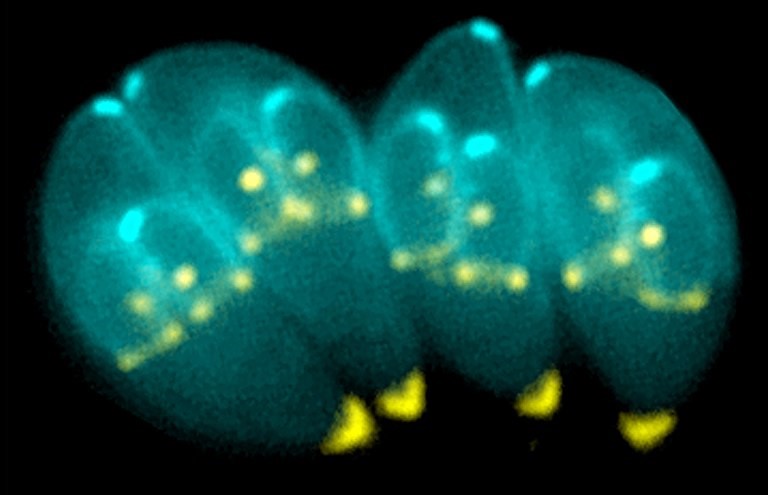Cat-borne Toxoplasma Gondii Linked to Frailty in the Elderly

Toxoplasma gondii, a common, cat-borne parasite already associated with risk-taking behaviour and mental illness in humans may also contribute to exhaustion, loss of muscle mass, and other signs of frailty in older adults, suggests a study published in the Journal of Gerontology: Medical Science.
The research, by an international team of scientists including University of Colorado Boulder, University of Maryland School of Medicine and the University of A Coruña in Spain, is the latest to explore how the tiny, single-celled organism T. gondii could have big impacts on human health.
“We often think of T. gondii infection as relatively asymptomatic, but this study highlights that for some people it may have significant health consequences later on,” said co-author Christopher Lowry, a professor at CU Boulder.
Some 11%–15% of people in the US have been infected with T. gondii at some point and rates tend to be far higher in older individuals. In some countries, more than 65% have been infected. Once infected, people can unknowingly harbour the parasite for life.
For the study, the team examined the blood of 601 Spanish and Portuguese adults over 65, along with measures of a common geriatric syndrome known as frailty – which includes unintentional weight loss, tiredeness, loss of cognitive sharpness and other indications of declining health.
A whopping 67% of study subjects were “seropositive” showing markers in their blood of a latent infection.
The researchers did not, as they originally hypothesized, find an association between any infection to T. gondii and frailty. But they did find that, among those infected, those with higher “serointensity” or a higher concentration of antibodies to the parasite, were significantly more likely to be frail.
Higher serointensity could reflect a more virulent or widespread infection, multiple infections or recent reactivation of a latent infection, the authors said.
“This paper is important because it provides, for the first time, evidence of the existence of a link between frailty in older adults and intensity of the response to T. gondii infection,” said co-author Blanca Laffon, a professor of psychobiology at the Interdisciplinary Centre of Chemistry and Biology at University of A Coruña.
How cats spread T. gondii
Wild and domestic felines are considered the definitive host of the parasite, while warm-blooded animals like birds and rodents serve as secondary hosts: When cats eat infected animals, T. gondii takes up residence and multiplies in their intestines, shedding eggs in their faeces.
People are typically infected via exposure to those eggs (via litter boxes, contaminated water or dirty vegetables) or by eating undercooked pork, lamb or other meat that’s infested.
Most people never know they’ve been infected, with only about 10% initially having brief flu-like symptoms. But T. gondii tends to linger dormant for decades, cloaked in cysts in muscle and brain tissue (specifically the emotion-processing region known as the amygdala) with some insidious impacts, mounting research suggests.
In a creepy evolutionary trick seemingly designed to benefit the parasite’s favourite host, rodents infected with T. gondii tend to lose their fear of felines, making it easier for cats to catch rats and mice. In the wild, infected chimpanzees have been shown to actually grow attracted to the smell of the urine of their feline predator, the leopard.
People who have been infected also tend to engage in risky behaviour, with research showing they tend to be more impulsive, more entrepreneurial and more likely to get in a car accident. They also have higher rates of schizophrenia, certain mood disorders, cognitive problems and are more likely to attempt suicide, according to research by Lowry and Dr Teodor Postolache, a professor in the Department of Psychiatry at University of Maryland School of Medicine and senior author on the new study.
A declining immune response?
The authors caution that the new study does not prove causation, but suggests the association should be researched.
They found that frail people with high T. gondii seropositivity also had higher levels of certain inflammatory markers, suggesting that infection with the parasite could exacerbate inflammation that already occurs with aging – aka. “inflammaging.”
Because latent T. gondii tends to hide out in muscle tissue, Postolache suspects it could also play a role in hastening sarcopenia.
Lowry’s research focuses on the impact microorganisms have on the immune system and, thus, mental health. He notes that many microbes that humans have evolved with impact health in a positive way – a theory known as the ‘Old Friends’ hypothesis. Even T. gondii may have health benefits we aren’t yet aware of, he said. But in some cases, a switch flips, and friends become enemies.
In the case of T. gondii, certain medications or immune compromising diseases like HIV or cancer can enable a latent infection to escape suppression and reactivate, with adverse effects. Even in people with healthy immune systems, Lowry notes, immune function can decline with age, potentially wakening dormant dormant T. gondii.
The researchers hope their study will inspire more research into the relationship between T. gondii and frailty, and ultimately lead to new ways of keeping the parasite from doing harm.
For now, they encourage people – especially pregnant and immunocompromised people – to take steps to avoid infection.
Tips for preventing infection:
Change litter box daily, and wash hands afterward.
Avoid eating undercooked meat.
Rinse fruits and vegetables.
If pregnant or immunocompromised:
Avoid changing the litter box if possible (T. gondii infection during pregnancy can cause serious problems to a developing foetus).
Keep cats indoors.
Avoid stray cats.



